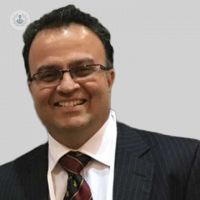Allurion gastric balloon: what we need to know
Written by:In one of our latest medical articles here below, revered consultant surgeon, Mr Vittal Rao, gives us a detailed insight into all things Allurion gastric balloon, including an outlining of the associated risks and recommended aftercare following the operation.

What is gastric balloon?
As the name indicates, a gastric balloon is a 400 to 500 millilitres of fluid-filled balloon which is introduced into the stomach through the swallowing of the patient. It is then inflated once it is in the correct place.
The balloon needs to be introduced endoscopically, and so anaesthetic is generally required. On the hand, the Allurion balloon is swallowed by the patient, and once it is in the correct position on the X-ray guidance, it is inflated. It does not require sedation nor anaesthesia. It is done in around 15 minutes. The Allurion balloon comes out through the back passage after about four months.
How does gastric balloon work?
The balloon occupies space inside the stomach, so the balloon hence contributes to the feeling of fullness. Patients feel fuller much quicker with a balloon in place.
What are the risks and benefits of gastric balloon?
The main benefit is weight loss. Patients can expect to lose up to between two to three stone within six months. It does not cause any changes to the patient’s gut. The insertion of a gastric balloon is not an invasive procedure, and it is reversible.
The risks associated with a gastric balloon include an increased risk of acid reflux. It can also lead to a blockage in the stomach, and rarely, it can cause damage to the stomach. Fortunately, though, these complications are very rare.
Who is a good candidate for gastric balloon?
Patients who do not want invasive surgery and who want to have a healthier lifestyle are ideal candidates. Patients who are mildly overweight are also suitable. Patients who want to undergo a gastric balloon procedure should not have medical conditions such as acid reflux.
What is the aftercare for gastric balloon?
The monitoring after surgery is hugely important for patients who undergo gastric balloon insertion. Patients will be given a digital weighting machine, and a Fitbit to monitor their physical activity.
Patients should try to stay as hydrated as possible after the procedure, and should stick to as healthy a diet as possible. Patients will have a follow-up appointment after six months.
To consult with Mr Vittal Rao, head over to his Top Doctors profile today.


